40 Tips to Live Your Best Life After 55
Embrace the richness of your 50s and beyond.
"Life moves pretty fast," the hero of Ferris Bueller's Day Off advised us in the '80s. Case in point: the apple-cheeked star of that film is now 61. As you mature, you learn that life keeps moving fast, even after the age you assumed things would slow down, and it's important to make the most of every place you are. But where to start? And how can you be sure you're living life to the fullest, especially in your 50s and beyond, a time that's rich with transitions? For advice, we consulted a variety of experts on mental and physical health and aging well. These are 40 tips that will help you live your best life after age 55.

"Whether it be via learning, traveling, or spending time with loved ones, create more memories," advises Dr. Cynthia Shaw, a licensed clinical psychologist in Chicago. "When we focus on creating memories, what we are really focusing on is being present and savoring each moment. The latter portion of our lives provides the perfect opportunity to love ourselves and love what we have created for ourselves."

"It's essential to focus on your mental health during this stage as it often comes with changes in work, family dynamics, and physical health," says Sophie Cress, LMFT, a licensed marriage and family therapist with SexualAlpha. "These changes can be challenging, but it's crucial to adapt to them positively. Being mindful can be incredibly helpful, which means being present in the moment and acknowledging your thoughts and feelings without judgment. Practicing mindfulness can help reduce anxiety and promote inner peace."
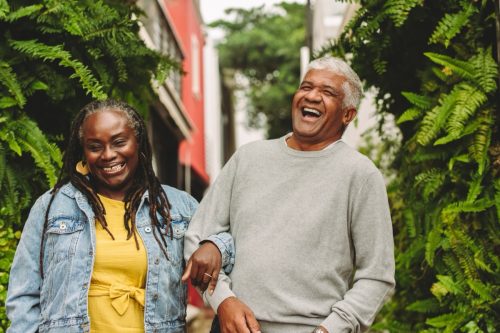
"Go for a walk every single day," says Caroline Grainger, an ISSA-certified personal trainer at FitnessTrainer.com. "There is no habit that will do more to help your long-term health and help you enjoy your golden years." Walking is a cardiovascular exercise that will boost your metabolism and improve your mood. "In addition to the endorphins that can come from exercise itself, it also gives you an opportunity to spend time outside in nature, and spend time connecting with friends, two practices that have their own long-term health benefits," she says.

"Finding work that is challenging and also allows you the time and flexibility to enjoy this part of life is important," says holistic health coach Robin Fischman, CHHC, AADP. "The best advice I can give to people 55 and older is to make a list of the most important things they want in a job and the things they no longer need. Solving challenging problems may fall high on the list; working 13-hour days will probably not be on the list. This can give us focus and satisfaction."

"Taking care of your physical and mental health is crucial at any age, but it becomes even more important as we get older," says Heather Wilson, LCSW, LCADC, CCTP, a licensed clinical social worker and executive director of Epiphany Wellness. "Make sure to schedule regular check-ups with your doctor and stay on top of any necessary screenings or vaccinations."

"Age is a number, yes, and getting older means you have to be more aware of your health and don't bury your head in the sand," says Dr. Kathryn Smerling, a psychotherapist in New York City "You have to realize you're getting older and that you have to take care of yourself. You can't do all you could at 21, but you can make sure you stay healthy. And you can look at this time of your life as one for new opportunities."

According to the Centers for Disease Control and Prevention, 41.5% of Americans over the age of 60 are obese. "Obesity-related conditions include heart disease, stroke, type 2 diabetes and certain types of cancer," says the CDC. "These are among the leading causes of preventable, premature death." Annual medical costs for adults with obesity are $1,861 higher, on average, than medical costs for people of healthy weight.

Scientists at UCLA found that just one night of bad sleep actually makes older adults' cells age faster. During sleep, the body repairs DNA, clearing debris and toxins that can lead to diseases associated with aging, including cancer and dementia. A study published in the journal Nature Communications found that people over 50 who sleep less than six hours a night are 30% more likely to develop dementia in their later years. Harvard research recommends getting at least six to eight hours of sleep per night to reduce the risk of dementia and death from any cause.

Staying curious and interested in life is essential for healthy aging, says Smerling. "Keep your brain active and engaged," advises Kim Homan, LMFT, a licensed marriage and family therapist and clinical director of Tennessee Behavioral Health. "This can be through puzzles, reading, or even taking online courses. The key is to challenge your mind and keep learning. Lifelong learning helps in keeping the brain agile and can even delay cognitive decline. Plus, learning new skills or diving into new subjects can be incredibly fulfilling and a great way to meet like-minded individuals."
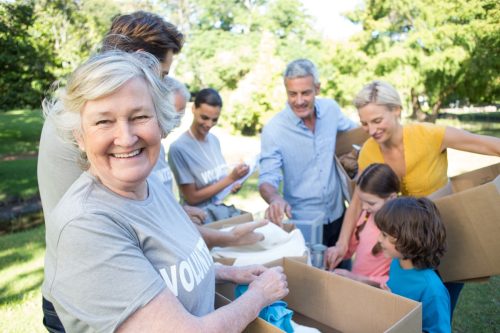
"Contributing to your community or a cause you care about can be incredibly rewarding," says Homan. "Volunteering can provide a sense of purpose and fulfillment. It's also a great way to meet people, learn new skills, and stay engaged with the world around you."
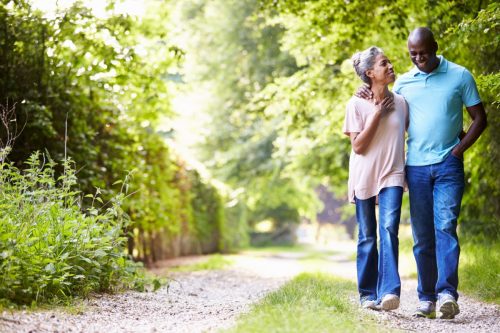
It doesn't take a lot of exercise to make a real difference in your health. Every little bit helps protect against diseases that become more common with age, including heart disease, cancer, osteoporosis, and dementia. Recent research has found that just a 10-minute run can boost your brain function and improve your mood, only 20 minutes of daily exercise can prevent heart disease (even at age 70), and walking 10,000 steps a day could cut your risk of developing dementia by 50%.

"Achieving a sense of financial stability is crucial" after 55, says Dr. Alejandro Alva, a psychiatrist and medical director of the Mental Health Center of San Diego. "This doesn't necessarily mean being wealthy but rather having a clear understanding and control over your finances. Budgeting, planning for retirement, and understanding your expenses and income can greatly reduce stress and improve your quality of life." Making sure you have a complete estate plan can eliminate a major source of stress in the later years.

"This is the time to strengthen existing bonds and create new ones," says Cress. "Communication is a crucial factor in this process. Be honest and open while conversing with your loved ones. Share your thoughts, feelings, and concerns, and actively listen to them as well. This two-way communication helps to build deeper connections and mutual understanding."

"It's never too late to establish new friendships or rekindle old ones," says Cress. "Social connections play a vital role in maintaining mental well-being. They provide a sense of belonging and support, and joining clubs, groups, or classes that align with your interests can provide great opportunities to meet like-minded people."

"One of the key ways to live your best life after 55 is to continue exploring and trying new things," says Wilson. "Whether it's taking up a new hobby or traveling to a new destination, don't be afraid to step out of your comfort zone and embrace new experiences. You never know what you may discover or learn about yourself: Maybe you'll find a new passion or hidden talent that you never knew existed."

"Focus on a balanced diet rich in whole grains, lean proteins, healthy fats, and a variety of fruits and vegetables," advises Chrissy Arsenault, RDN, a registered dietitian with Trainer Academy. "Aim for nutrient-dense foods to support overall health as you age to fuel your day-to-day activities."

Older adults may have a decreased sense of thirst and can become dehydrated more easily. "So it's especially important to be mindful of fluid intake," says Arsenault. "Stay adequately hydrated by drinking plenty of water throughout the day. I encourage my clients to drink fruit-infused water if they get bored with regular water."

"Incorporate strength training exercises to preserve muscle mass, bone density, and functional independence," says Arsenault. This can include bodyweight exercises, resistance bands, or weights.
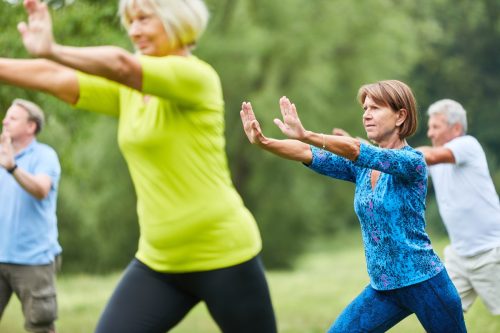
Arsenault encourages her clients over 55 to focus on activities that improve flexibility and balance, such as yoga or tai chi, to reduce the risk of falls and maintain mobility.

"As we get older, we lose bone density," says Arsenault. "To help mitigate this, consume plenty of calcium and vitamin D through foods like dairy products, leafy greens, fortified foods, or supplements as advised by a healthcare professional, to support bone health and reduce the risk of osteoporosis."

"As we get older, we often lose touch with things that used to bring us joy," says Wilson. "Take some time to think back on what made you happy in the past and try to incorporate those activities into your life again. Did you used to love painting but haven't picked up a brush in years? Maybe photography was a passion of yours that has fallen by the wayside. Whatever it may be, don't be afraid to reconnect with those old passions and bring that joy back into your life."

"If your health and finances allow, traveling can be a wonderful way to experience new cultures, meet people, and gain fresh perspectives," says Alva. "Travel doesn't always have to be far-flung; local and regional trips can also provide enriching experiences.

Older people are more susceptible to serious illness from viruses and bacteria that only minorly afflict younger people. Make sure you're up to date on all recommended vaccinations, including flu, COVID-19, RSV, shingles, and pneumococcal pneumonia.
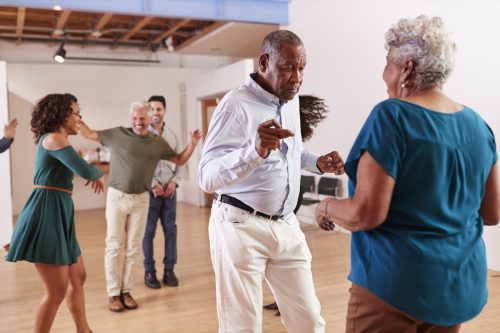
"Being part of a community can bring a sense of purpose and belonging, especially as we age," says Wilson. "Consider getting involved in local groups or organizations that align with your interests or values. This can provide opportunities to meet new people and make meaningful connections."

A Harvard study of 3,500 people over age 60 published in the American Journal of Clinical Nutrition found that taking a multivitamin for one year was associated with improved memory and cognition—the equivalent of reducing age-related memory loss by three years.

"Take some time to reflect on your life experiences, acknowledge your accomplishments,
and identify areas for improvement," says Cress. "This self-awareness fosters emotional maturity and strengthens relationships. It's also important to practice empathy and compassion, both towards yourself and others. Showing kindness and understanding different perspectives can greatly enhance your relationships."
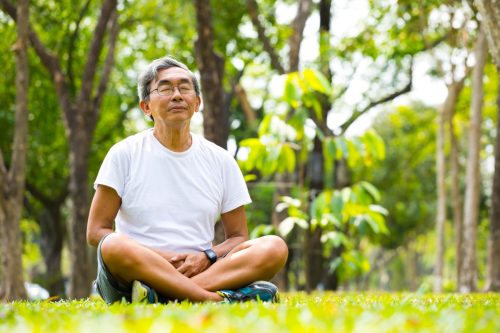
"Whether through organized religion, meditation, nature, or personal reflection, many find that nurturing their spiritual life provides comfort, community, and a sense of peace," says Alva.

According to Harvard Medical School, more than 70 percent of men older than 55 technically have high blood pressure, defined as a measurement higher than 120/80. Over time, high blood presssure can damage blood vessels, increasing your chances of a heart attack, stroke, erectile dysfunction, kidney problems, and dementia. Get your blood pressure checked regularly, and follow your healthcare provider's advice on keeping it a healthy range.

Eating too much sugar can prematurely age your body, increasing your chance of obesity and associated health problems like cardiovascular disease and diabetes. Reducing the amount of processed foods and sugar-sweetened beverages you consume can seriously improve your health.

Scientists say that getting too much exposure to blue light, the kind emitted from phones and computer screens, may accelerate aging. A 2019 study published in Aging and Mechanisms of Disease found that blue light can damage cells in the brain and eyes. To avoid this, the researchers recommend wearing blue light glasses and limiting screen time.
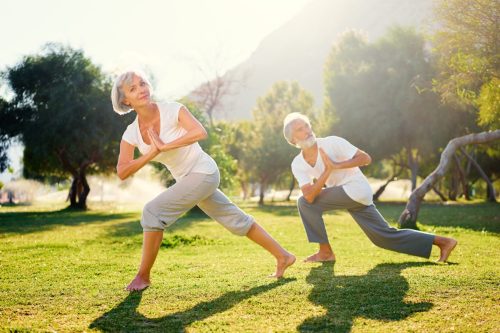
"Practices like yoga, tai chi, or meditation focus on the connection between mind and body," says Alva. "They are excellent for maintaining flexibility, balance, and mental clarity, and are often recommended for their stress-reducing and health-improving benefits."

When it comes to quitting tobacco, it really is never too late to see life-extending benefits. Even people who quit smoking between the ages of 65 to 69 can add one to four years to their lives, experts say. Conversely, continuing to smoke after 60 raises your risk of chronic health conditions that increasingly affect older people, such as high blood pressure, diabetes, heart disease, arthritis and cancer. Cigarette smoking is still the No. 1 preventable cause of death.

Drinking alcohol to excess raises your risk of heart disease and seven types of cancer, while marijuana use in older people has been associated with an increased risk of injuries and falls. Avoiding recreational drugs and drinking only in moderation can prevent expensive medical consequences.

Everyone is eligible for Medicare upon turning 65. But you can't sign up at any point thereafter. Your initial enrollment period lasts for seven months, starting three months before you turn 65, and ending three months after the month you turn 65. If you miss this window, you may have to pay an expensive late enrollment penalty for the rest of your life. Check your state's guidelines and enroll at the right time to avoid penalties and ensure comprehensive coverage.
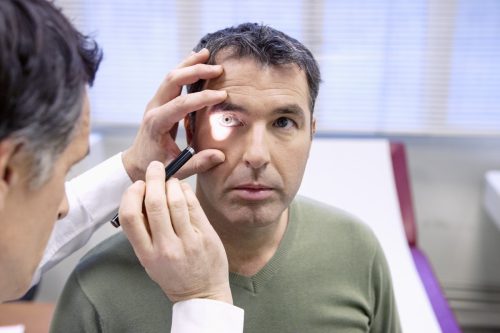
According to a UK study, having untreated hearing loss was associated with a 42 percent increase in dementia risk compared to people who had no hearing difficulty. And research published in JAMA Internal Medicine found that older people who have cataracts removed are nearly 30 percent less likely to develop dementia, including Alzheimer's, than people with cataracts who don't get the surgery.

"Make sure to give importance to intimacy and physical bonding," advises Cress. "Regardless of whether it is with a new person or a long-term partner, try to explore physical and emotional intimacy in ways that feel right and satisfying for you. This kind of closeness—both physical and emotional—helps build strong connections and contributes to one's overall well-being."

"As we enter this chapter of life, we may experience changes in our roles such as becoming grandparents, taking care of aging parents, or transitioning to retirement," says psychologist Dr. Ketan Parmar. "It's natural to feel a sense of loss or uncertainty during these transitions, but embracing change can lead to personal growth and fulfillment. Seek support from loved ones or a therapist if needed, and view these changes as an opportunity for new experiences and accomplishments."
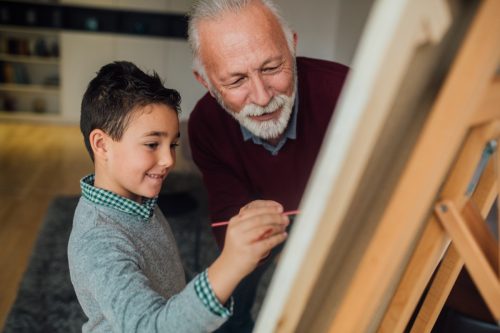
"Whether through creative pursuits, mentoring, or engaging in value-driven activities, finding what resonates deeply with you can significantly enhance your mental and physical well-being," says Jennifer Worley, LMFT, clinical director of First Light Recovery. A 2019 study published in JAMA found a link between a strong sense of purpose in life and a lower risk of dying from any cause after age 50.

A study at the University of Toronto—which followed more than 7,000 middle-aged and older people for about three years—found that those who participated in volunteer work and recreational activities were more likely to maintain excellent health and less likely to develop physical, cognitive, mental, or emotional problems. "Being socially active is important no matter how old we are," said the study's lead author. "Feeling connected and engaged can boost our mood, reduce our sense of loneliness and isolation, and improve our mental health and overall health."
RELATED: 2 Alternatives That Are Just As Beneficial as Walking 10,000 Steps

"While climbing the age ladder has some benefits, there can be many difficulties that come with age, such as declining health, loss of friends and family, and changing identity as our interests and activities develop," says Shaw. "If you find yourself experiencing low mood, difficulty enjoying life, negative thoughts, and loneliness, it can be helpful to chat with a trained mental health professional. It's never too late to start working on yourself."






















